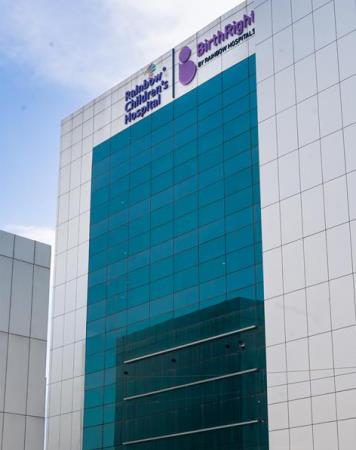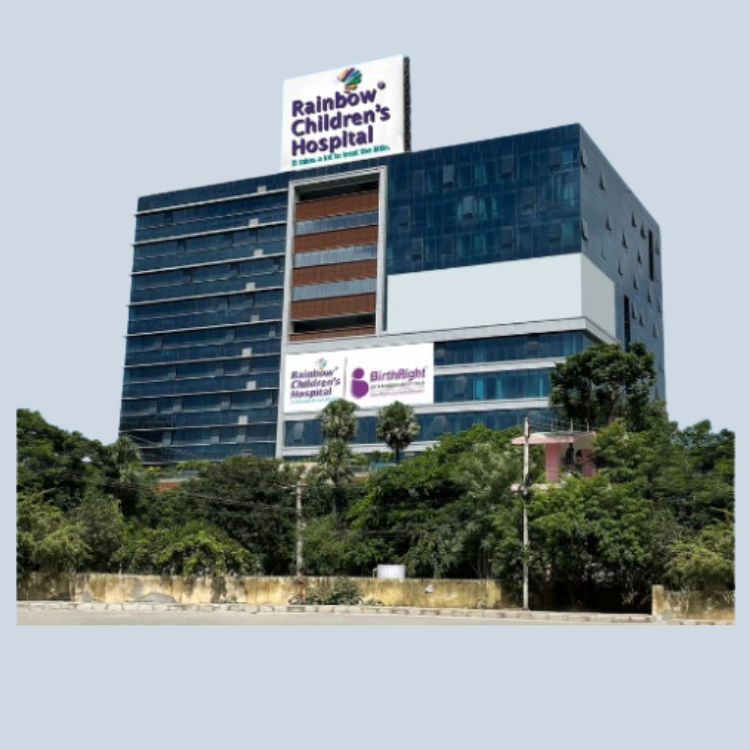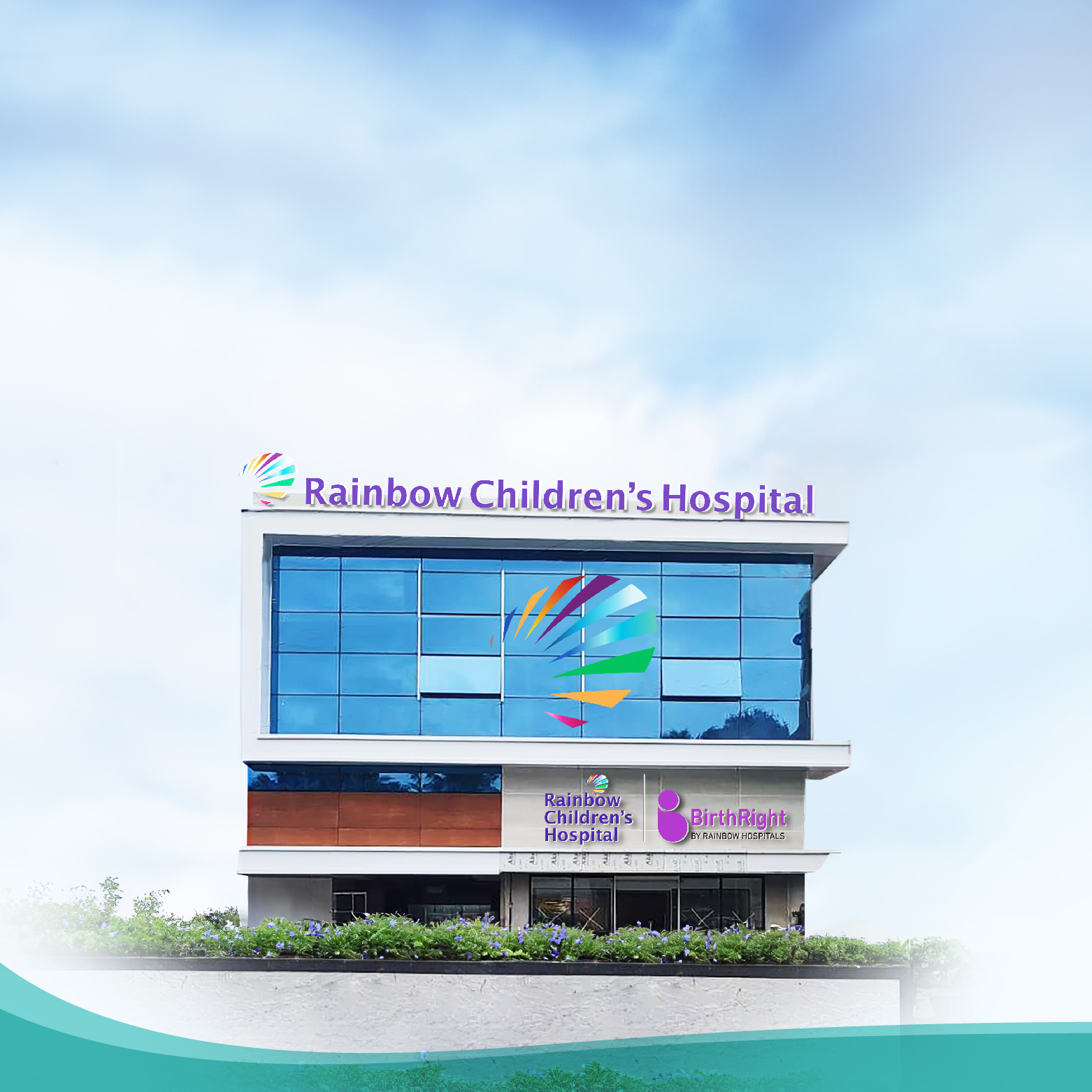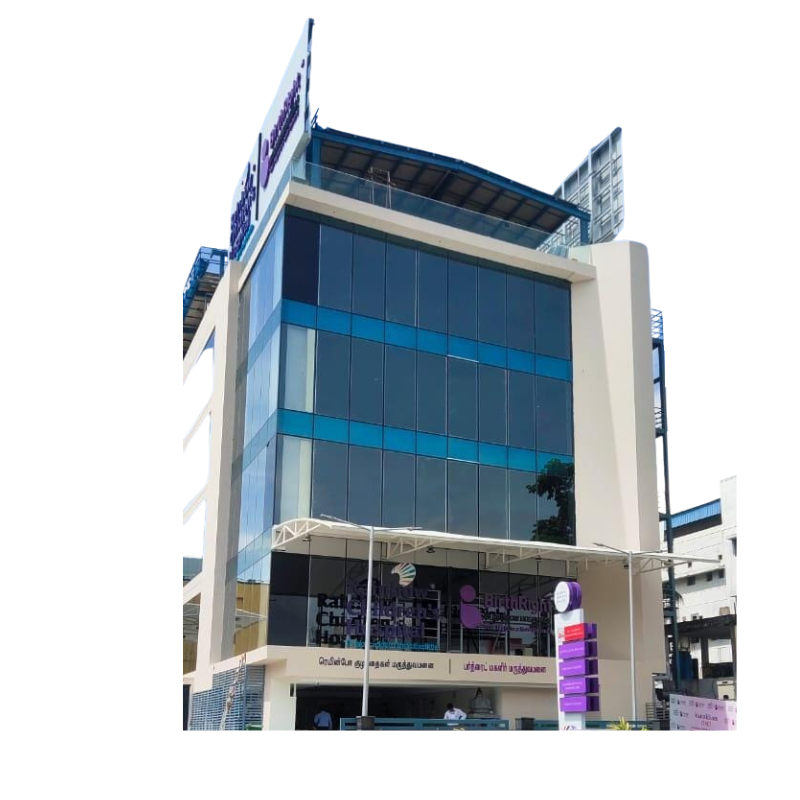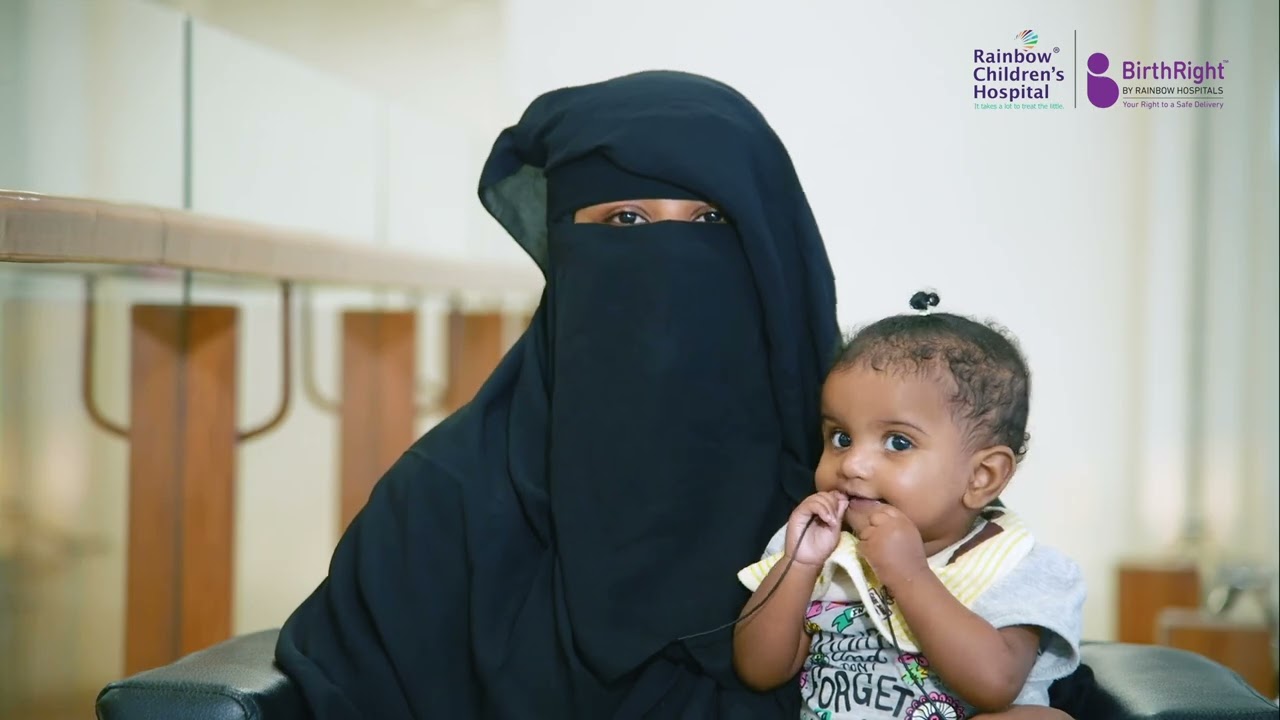Seamless support from diagnosis to post treatment care
Bone Marrow Transplant Unit
A bone marrow transplant involves the replacement of bone marrow responsible for generating new blood cells. Pediatric blood disorders, while not always malignant, can profoundly impact a child's quality of life and, in certain cases, pose a fatal threat.
Conditions like childhood anemia, iron deficiency anemia, iron-refractory iron deficiency anemia, congenital sideroblastic anemia, and congenital dyserythropoietic anemia can be effectively treated through bone marrow transplants. Additionally, children with specific types of cancer and blood disorders, such as sickle cell disease, leukemia, and thalassemia, can find significant benefits from this procedure.
The bone marrow transplant is a complex and major medical undertaking, demanding the utmost care and specialized oncological expertise. At Rainbow Children's Hospital, our distinguished team of Pediatric Oncologists, Hematologists, and super specialists has garnered renowned for their extensive experience in performing over 70 successful Best Bone Marrow Transplants.
Our Bone Marrow Transplant Unit (BMTU) at Rainbow Children’s Hospital offers comprehensive services, including:
1. In-house blood bank facility.
2 .RO water supply for all purposes.
3. High-efficiency particulate air module (HEPS) filters, maintaining positive air pressure and filtering particles within the BMTU unit.
4. A laminar hood for the sterile preparation of medications.
5. Pass boxes for the sterilization of items like food before entering the BMTU.
6. 24/7 availability of doctors and one-to-one barrier nursing to ensure a high success rate.
Key Highlights:
1. Specialises in handling high risk cancer & non-malignant conditions that are curable with stem cell transplants
2. Specially trained nursing staff well versed with handling various procedures, preparations & other nursing aspects to provide quality care to patients
..
Find a Doctor
Expertise you can trust, Meet our esteemed doctors who bring exceptional knowledge, compassion, and innovation to provide top-notch care for your health and well-being.
Our Hospitals and ClinicsOur Hospitals and Clinics
Rainbow Children's Hospital stands as a testament to the hospital's continual pursuit of excellence and innovation, providing specialized care for women and children.
Request a Call back
Tap to Fill FormRequest a Call back
Blogs
Discover our most recent health articles provided by our reliable experts.
What Are People Saying About Us
Embark on a journey of inspiration and hope with our patient success stories, complemented by informative videos from our dedicated doctors.
Stem cells are first taken from a donor from either the bone marrow, the umbilical cord blood, or the circulating peripheral blood. These stem cells will be transfused into the bloodstream of the patient. The cells will find their way to the marrow spaces of the bone. Once they reach there, they will start growing and multiplying and repopulating the bloodstream with RBCs, WBCs, and platelets. best hospital for bone marrow transplant in India and best hospital for bone marrow transplant in Bangalore provides the best treatment for Bone Marrow Transplantation.
When bone marrow fails and a BMT is needed for replacing the abnormal or the absent blood cells. The functional stem cells then produce the blood cells and help strengthen the immune system.
There are three situations that call the need for a Bone Marrow Transplant:\n\n When bone marrow fails and a BMT is needed for replacing the abnormal or the absent blood cells. The functional stem cells then produce the blood cells and help strengthen the immune system.\n When your child has cancer, the BMT is needed for replacing the stem cells that were killed because of radiation therapy and high dose chemotherapy.\n When there are some genetic errors present, BMT is needed for replacing the absent or defective cells that originated in the bone marrow. :12929, 3,, 15 Merriweather When your child has cancer, the BMT is needed for replacing the stem cells that were killed because of radiation therapy and high dose chemotherapy.
There are three situations that call the need for a Bone Marrow Transplant:\n\n When bone marrow fails and a BMT is needed for replacing the abnormal or the absent blood cells. The functional stem cells then produce the blood cells and help strengthen the immune system.\n When your child has cancer, the BMT is needed for replacing the stem cells that were killed because of radiation therapy and high dose chemotherapy.\n When there are some genetic errors present, BMT is needed for replacing the absent or defective cells that originated in the bone marrow. :12929, 3,, 15 Merriweather When there are some genetic errors present, BMT is needed for replacing the absent or defective cells that originated in the bone marrow.
Acute Lymphocytic Leukemia (ALL)
Acute Myelogenous Leukemia (AML)
Adrenoleukodystrophy (ALD)
Aplastic anemia
Brain tumors
Chronic Lymphocytic Leukemia (CLL)
Chronic Myelogenous Leukemia (CML)
Epidermolysis Bullosa
Ewing's sarcoma
Fanconi Anemia
Globoid cell
Hodgkin's disease
Hurlers syndrome
Immune deficiency
Juvenile Myelomonocytic Leukemia (JMML)
Krabbe’s Disease
Maroteaux-Lamy syndrome
Metachromatic Leukodystrophy (MLD)
Multiple Myeloma
Myelodysplastic Syndrome (MDS)
Neuroblastoma
Non-Hodgkin's lymphoma
Osteopetrosis
Renal cell carcinoma
Sickle Cell Anemia
Thalassemia
Allogenic - In this, stem cells are taken from an acceptable human leukocyte antigen (HLA) donor match for your child. This can be a related or unrelated donor.
Here are the 3 different forms of Stem Cell Transplant:\n\n Allogenic - In this, stem cells are taken from an acceptable human leukocyte antigen (HLA) donor match for your child. This can be a related or unrelated donor.\n Autologous - In this, stem cells from your child are taken before they undergo a conditioning or an intense preparative regimen. The stem cells are given back to them after the procedure.\n Syngeneic - In this, stem cells are taken from the identical twin of your child. :12929, 3,, 15 Merriweather Autologous - In this, stem cells from your child are taken before they undergo a conditioning or an intense preparative regimen. The stem cells are given back to them after the procedure.
Here are the 3 different forms of Stem Cell Transplant:\n\n Allogenic - In this, stem cells are taken from an acceptable human leukocyte antigen (HLA) donor match for your child. This can be a related or unrelated donor.\n Autologous - In this, stem cells from your child are taken before they undergo a conditioning or an intense preparative regimen. The stem cells are given back to them after the procedure.\n Syngeneic - In this, stem cells are taken from the identical twin of your child. :12929, 3,, 15 Merriweather Syngeneic - In this, stem cells are taken from the identical twin of your child.
From the hip bone of the donor. Anesthesia is used on the patient and then blood is collected from the middle of the marrow space or the bone.
The stem cells can be harvested through the following:\n\n From the hip bone of the donor. Anesthesia is used on the patient and then blood is collected from the middle of the marrow space or the bone.\n From their peripheral blood. In this case, special intravenous catheters are used where they are connected to a machine that is filtering the blood and collecting the stem cells.\n From a cord blood unit. In such cases, mothers donate their blood to the registry of stem cells. After the birth of the baby, blood from the umbilical cord that is rich in hematopoietic stem cells is frozen so that it can be used later. :12929, 3,, 15 Merriweather From their peripheral blood. In this case, special intravenous catheters are used where they are connected to a machine that is filtering the blood and collecting the stem cells.
The stem cells can be harvested through the following:\n\n From the hip bone of the donor. Anesthesia is used on the patient and then blood is collected from the middle of the marrow space or the bone.\n From their peripheral blood. In this case, special intravenous catheters are used where they are connected to a machine that is filtering the blood and collecting the stem cells.\n From a cord blood unit. In such cases, mothers donate their blood to the registry of stem cells. After the birth of the baby, blood from the umbilical cord that is rich in hematopoietic stem cells is frozen so that it can be used later. :12929, 3,, 15 Merriweather From a cord blood unit. In such cases, mothers donate their blood to the registry of stem cells. After the birth of the baby, blood from the umbilical cord that is rich in hematopoietic stem cells is frozen so that it can be used later.
Complications to organs - The procedure of bone marrow transplant can damage other organs of the body. The most commonly affected organs are the heart, kidneys, lungs, and liver. It is important that during the procedure, all the organs are closely monitored.
Here are the risks involved in the Bone Marrow Transplant:\n\n Complications to organs - The procedure of bone marrow transplant can damage other organs of the body. The most commonly affected organs are the heart, kidneys, lungs, and liver. It is important that during the procedure, all the organs are closely monitored.\n Infection - The immune system of your body will be weak making them at high risk for bacterial, fungal, and viral infections. The infections can be from within the body or from an outside source. To prevent infections, your child will be given medications. There are new medicines and therapies that can be used for preventing and treating medications. In some cases, Cytotoxic T Lymphocytes (CTLs), s special immune system is delivered to prevent viral infections.\n Mucositis - This is a side effect of chemotherapy where the mucous membranes are destroyed resulting in pain, inflammation, and bleeding. This can affect the throat, mouth, and gastrointestinal tract. This side effect resolves when the WBC count increases. There are some pain and palliative services that can minimize your child’s discomfort.\n Graft-Versus-Host Disease (GVHD) - This condition is caused when the donor’s graft is recognized by the body as a foreign substance and it triggers a reaction. It can damage the organs of the body affecting their functionality. The condition can be anywhere between mild and life-threatening. There are some medications that your doctor might prescribe your child which suppresses the immune system. However, this makes your body more vulnerable to infections.\n Thrombotic Microangiopathy (TMA) - This is a condition in which the blood vessels get inflamed causing the formation of small blood clots. This can result in high blood pressure, leakage of protein from urine, and kidney injury. In extreme cases, the heart, lungs, and gut are affected as well. You can visit the best bone marrow transplant surgery hospital in Bangalore for the best treatment. :12929, 3,, 15 Merriweather Infection - The immune system of your body will be weak making them at high risk for bacterial, fungal, and viral infections. The infections can be from within the body or from an outside source. To prevent infections, your child will be given medications. There are new medicines and therapies that can be used for preventing and treating medications. In some cases, Cytotoxic T Lymphocytes (CTLs), s special immune system is delivered to prevent viral infections.
Here are the risks involved in the Bone Marrow Transplant:\n\n Complications to organs - The procedure of bone marrow transplant can damage other organs of the body. The most commonly affected organs are the heart, kidneys, lungs, and liver. It is important that during the procedure, all the organs are closely monitored.\n Infection - The immune system of your body will be weak making them at high risk for bacterial, fungal, and viral infections. The infections can be from within the body or from an outside source. To prevent infections, your child will be given medications. There are new medicines and therapies that can be used for preventing and treating medications. In some cases, Cytotoxic T Lymphocytes (CTLs), s special immune system is delivered to prevent viral infections.\n Mucositis - This is a side effect of chemotherapy where the mucous membranes are destroyed resulting in pain, inflammation, and bleeding. This can affect the throat, mouth, and gastrointestinal tract. This side effect resolves when the WBC count increases. There are some pain and palliative services that can minimize your child’s discomfort.\n Graft-Versus-Host Disease (GVHD) - This condition is caused when the donor’s graft is recognized by the body as a foreign substance and it triggers a reaction. It can damage the organs of the body affecting their functionality. The condition can be anywhere between mild and life-threatening. There are some medications that your doctor might prescribe your child which suppresses the immune system. However, this makes your body more vulnerable to infections.\n Thrombotic Microangiopathy (TMA) - This is a condition in which the blood vessels get inflamed causing the formation of small blood clots. This can result in high blood pressure, leakage of protein from urine, and kidney injury. In extreme cases, the heart, lungs, and gut are affected as well. You can visit the best bone marrow transplant surgery hospital in Bangalore for the best treatment. :12929, 3,, 15 Merriweather Mucositis - This is a side effect of chemotherapy where the mucous membranes are destroyed resulting in pain, inflammation, and bleeding. This can affect the throat, mouth, and gastrointestinal tract. This side effect resolves when the WBC count increases. There are some pain and palliative services that can minimize your child’s discomfort.
Here are the risks involved in the Bone Marrow Transplant:\n\n Complications to organs - The procedure of bone marrow transplant can damage other organs of the body. The most commonly affected organs are the heart, kidneys, lungs, and liver. It is important that during the procedure, all the organs are closely monitored.\n Infection - The immune system of your body will be weak making them at high risk for bacterial, fungal, and viral infections. The infections can be from within the body or from an outside source. To prevent infections, your child will be given medications. There are new medicines and therapies that can be used for preventing and treating medications. In some cases, Cytotoxic T Lymphocytes (CTLs), s special immune system is delivered to prevent viral infections.\n Mucositis - This is a side effect of chemotherapy where the mucous membranes are destroyed resulting in pain, inflammation, and bleeding. This can affect the throat, mouth, and gastrointestinal tract. This side effect resolves when the WBC count increases. There are some pain and palliative services that can minimize your child’s discomfort.\n Graft-Versus-Host Disease (GVHD) - This condition is caused when the donor’s graft is recognized by the body as a foreign substance and it triggers a reaction. It can damage the organs of the body affecting their functionality. The condition can be anywhere between mild and life-threatening. There are some medications that your doctor might prescribe your child which suppresses the immune system. However, this makes your body more vulnerable to infections.\n Thrombotic Microangiopathy (TMA) - This is a condition in which the blood vessels get inflamed causing the formation of small blood clots. This can result in high blood pressure, leakage of protein from urine, and kidney injury. In extreme cases, the heart, lungs, and gut are affected as well. You can visit the best bone marrow transplant surgery hospital in Bangalore for the best treatment. :12929, 3,, 15 Merriweather Graft-Versus-Host Disease (GVHD) - This condition is caused when the donor’s graft is recognized by the body as a foreign substance and it triggers a reaction. It can damage the organs of the body affecting their functionality. The condition can be anywhere between mild and life-threatening. There are some medications that your doctor might prescribe your child which suppresses the immune system. However, this makes your body more vulnerable to infections.
Here are the risks involved in the Bone Marrow Transplant:\n\n Complications to organs - The procedure of bone marrow transplant can damage other organs of the body. The most commonly affected organs are the heart, kidneys, lungs, and liver. It is important that during the procedure, all the organs are closely monitored.\n Infection - The immune system of your body will be weak making them at high risk for bacterial, fungal, and viral infections. The infections can be from within the body or from an outside source. To prevent infections, your child will be given medications. There are new medicines and therapies that can be used for preventing and treating medications. In some cases, Cytotoxic T Lymphocytes (CTLs), s special immune system is delivered to prevent viral infections.\n Mucositis - This is a side effect of chemotherapy where the mucous membranes are destroyed resulting in pain, inflammation, and bleeding. This can affect the throat, mouth, and gastrointestinal tract. This side effect resolves when the WBC count increases. There are some pain and palliative services that can minimize your child’s discomfort.\n Graft-Versus-Host Disease (GVHD) - This condition is caused when the donor’s graft is recognized by the body as a foreign substance and it triggers a reaction. It can damage the organs of the body affecting their functionality. The condition can be anywhere between mild and life-threatening. There are some medications that your doctor might prescribe your child which suppresses the immune system. However, this makes your body more vulnerable to infections.\n Thrombotic Microangiopathy (TMA) - This is a condition in which the blood vessels get inflamed causing the formation of small blood clots. This can result in high blood pressure, leakage of protein from urine, and kidney injury. In extreme cases, the heart, lungs, and gut are affected as well. You can visit the best bone marrow transplant surgery hospital in Bangalore for the best treatment. :12929, 3,, 15 Merriweather Thrombotic Microangiopathy (TMA) - This is a condition in which the blood vessels get inflamed causing the formation of small blood clots. This can result in high blood pressure, leakage of protein from urine, and kidney injury. In extreme cases, the heart, lungs, and gut are affected as well. You can visit the best bone marrow transplant surgery hospital in Bangalore for the best treatment.
Quick Links
- Best Pediatric Bone Marrow Transplant Specialists In Hyderabad
- Best Pediatric Bone Marrow Transplant Specialists In Bangalore
- Best Pediatric Bone Marrow Transplant Specialists In Delhi
- Best Pediatric Bone Marrow Transplant Specialists In Chennai
- Best Pediatric Bone Marrow Transplant Specialists In Vijayawada
- Best Pediatric Bone Marrow Transplant Specialists In Vizag
- Best Pediatric Bone Marrow Transplant Specialists In Marathahalli
- Best Pediatric Bone Marrow Transplant Specialists In Bannerghatta
- Best Pediatric Bone Marrow Transplant Specialists In Banjarahills
- Top Pediatric Bone Marrow Transplant Specialists in India
- Pediatric Bone Marrow Transplant Specialists near me in Banjarahills
- Best Bone Marrow Transplant in Sarjapur Road, Bengaluru
- Best Bone Marrow Transplant in Sarjapur Road, Bengaluru
- Best Bone Marrow Transplant in Himayatnagar, Hyderabad
- Best Bone Marrow Transplant in Anna Nagar, Chennai










